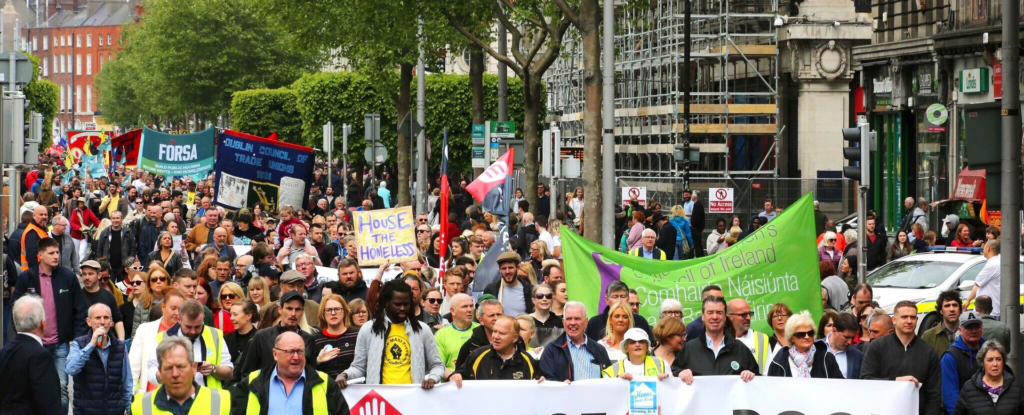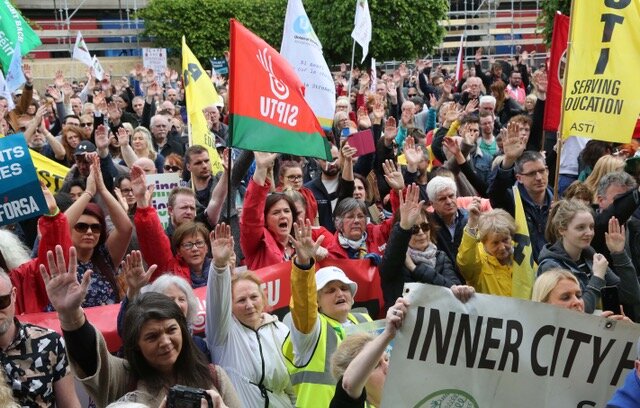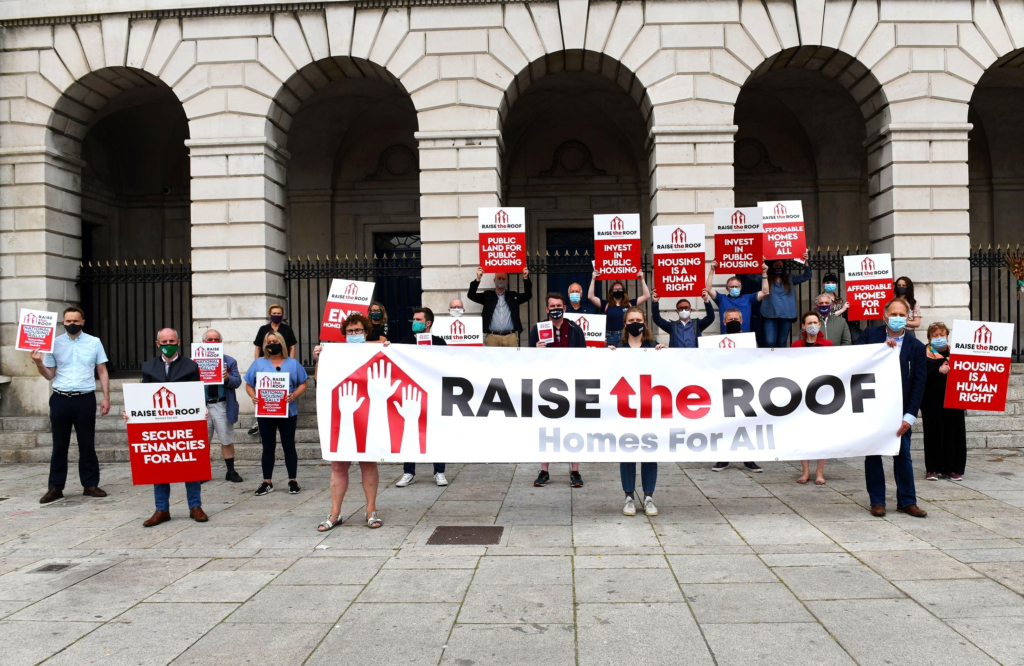What does a “right to housing” mean?
Words: Ellen Kenny, Eva O’Beirne
Art: Jan Walsh
Images: Unsplash, Oireachtas na hÉireann, Raise the Roof
On Saturday, November 26, housing activists Raise the Roof are organising the Rally for Housing, protesting the shortage and advocating for a constitutional right to housing. But what does a right to housing mean, and how can Ireland implement it?
Houses. We all want one. We all deserve one. People have campaigned, protested and have even been arrested trying to find one. A roof over one’s head is one of the most basic human needs. But it is also causing some of the most contentious discussions and debates.
For years, academics and activists have urged Irish people to reconsider how they view a house. To view it as a natural right, rather than a commodity reserved only for those on high salaries. Now, the deepening crisis has spurred the conversations further.
Ireland is in a crisis, or as President Higgins more accurately said in June, a disaster. There are now over 11,000 homeless people in Ireland, with more than half of them in Dublin alone. Approximately one in four Irish adults are affected by hidden homelessness. Counter-intuitively, there are 166,752 vacant homes in Ireland.
In 2021, 20,433 homes were built, but just 7,568 of those were actually bought by home buyers. Property developers have taken over the housing market, and the Government shows no indication of changing this. The average house price is now almost ten per cent more expensive than last year. The average cost of rent for a whole property in Dublin is now 2,258 euros per month. There were just 345 homes listed for rent in the Dublin market on November 1, a slight increase from the record low of 292 in August but still the lowest availability of properties to rent for November on record.
The statistics keep building up, but the bottom line is that the current system is broken. Despite this, the government recently voted down a proposal to declare the current housing situation an “emergency”.
With the rent and homeless rates rising and the number of properties available dropping, people are taking matters into their own hands. Housing campaign Raise the Roof has organised a Rally for Housing on Parnell Square on November 26 at 13:00, protesting against the seeming inertia of the Irish government to take action and provide homes. In particular, several academics, activists and regular people are advocating for the government to introduce a constitutional right to housing.
At the start of July, the Housing Commission launched the Public Consultation on a Referendum on Housing. Closing on September 2, the consultation was formed to figure out the logistics of implementing the right to housing through a referendum, and whether this is something that should even happen.
But what does a right to housing mean, and why are people rallying for it? Why do we need a referendum about it? And what would a constitutional right to housing actually change about Ireland?

What is a “right to housing”?
According to constitutional expert Professor David Kenny, there are many ways the right to housing could be worded in the constitution, “depending on how far you want the constitutional protection to go, and what you want it to do.”
Kenny suggested that Ireland might follow the lead from other countries that have implemented a right to housing, such as South Africa. The right to housing in Búnreacht na hÉireann, then, would read:
Article 43A- HOUSING
1. The State acknowledges that everyone in the State has the right to have access to appropriate, affordable and secure housing.
2. The State shall take reasonable legislative and other measures, within its available resources, to achieve the progressive realisation of this right, in accordance with the common good and the principles of social justice.
3. No person may be evicted from their home, or have their home demolished, without a court order made after considering all relevant circumstances. No legislation may permit arbitrary evictions.
Sounds pretty fun, doesn’t it? Kenny reckons that the more direct wording, the better. People need to understand what they’re voting for, of course.
What would the government be required to do?
Right now, the Government hasn’t taken a very active approach to housing in Ireland. As Professor Rory Hearne, author of “Gaffs: Why No One Can Get a House”, put it, “at the moment the Government just hands over responsibility for the provision of housing to the private developers and investor funds – it’s all about the market. But the market has failed over and over and over to provide affordable homes.”
So, let’s say we go with Kenny’s suggestion of how to word the right to housing. Hypothetically, it passes. What is the Government obliged to do now?
To put one question to bed, a right to housing would not mean everyone gets a free house. Despite what objections say, it wouldn’t mean you could stop paying rent and not get evicted. It wouldn’t mean that someone could break into your house and claim that they’re your new roommate under their constitutional right to a house.
According to Sinn Féín’s spokesperson for Housing Eoin Ó Broin TD, the constitutional right to housing simply “places the legal obligation on the State to take whatever action it feels necessary to get people homes.”
Right now, if the Government refused to let you marry your partner of the same-sex, or get an abortion, you can bring a lawsuit to the High Court of Ireland. Now imagine if you could do that if the Government was ignoring unfair evictions? Or if they were allowing too many homes to go vacant and too many people to remain homeless? Or they allowed too many vacant properties in your area?
“If the State was in breach of the right to housing, which was negatively affecting people, the people affected could take matters into their own hands and challenge the State in court, and the Court could decide if the State was breaching the Constitution.”
Ó Broin thinks that these lawsuits would be “few and far between”. But citizens having the ability to “take matters into their own hands if they feel they are being denied their rights” would likely prompt the Government to take a lot more action.
Ó Broin explained that whatever action the State takes to implement the right to housing “is a matter of the democratic process”. In other words, Fianna Fáil would implement the right to housing in a different way than Fine Gael. And they would obviously do it a different way than Sinn Féin.
But even if a constitutional right to housing creates less of a checklist and more of a nudge, that nudge would break down a lot of barriers.
Hearne says, “I don’t see any other way of making systemic change in this country other than putting a clear right to housing in the Constitution that would make the Government and State, whatever Government is in place, obliged under the highest document and guiding principles in this country to ensure everyone has access to a home.”
I don’t see any other way of making systemic change in this country other than putting a clear right to housing in the Constitution
Rory Hearne

How will landlords, tenants, and owners be affected?

Hearne explains that the right to housing would need to go under section 43 of Búnreacht na hÉireann to balance the right to private property. The right to private property is what grants landlords and development companies the right to own multiple properties and rent them out to tenants.
The constitution also states that private property cannot conflict with “the common good”. But this right is what largely protects landlords from measures that would protect tenants such as rent freezes and stricter regulation of evictions.
Previous governments have refrained from implementing rent freezes or controlling the amount of property one person or company owns, in the name of private property rights. However, a constitutional right to housing would, in many cases, require these measures.
As Hearne explains, “Currently policies such as extending the ban on evictions, removing the ability to evict a tenant on sale of a property, or putting some aspects of controls on rents are deemed not possible by the Government due to potential constitutional issues.”
“Putting in place a right to housing is about creating a housing system that is balanced, that works for people to provide a home.”
Rory Hearne
Under a right to housing, however, the common good might prevail: “This right to housing should make it clear that such policies are possible, so the impact of it on landlords will be about strengthening tenants’ security of tenure and rights.”
“A right to housing will further strengthen home ownership, as it will copperfasten people’s right to their home,” Hearne suggests, “Putting in place a right to housing is about creating a housing system that is balanced, that works for people to provide a home.”
“There will still be privately owned and provided housing and hopefully a significant increase in public housing. It should actually lead to an increase in affordable home-ownership as our housing market becomes focused on providing homes, not investment assets, and it should lead to an increase in social housing, and in affordable rental housing.”
Landlords have previously highlighted their concerns over their rights being infringed on by the government this year. The current ‘eviction ban’ caused landlords to claim that they were being discriminated against. A first step to securing a right to housing, this eviction ban echoes previous actions taken to protect tenants during the pandemic and is in place until March 2023.
Focus Ireland has previously pointed out that the number of people in emergency accommodation in Ireland actually fell during the pandemic and that the total ban on evictions was “clearly a very significant factor, with strong evidence that the banning of ‘eviction-to-sell’ being the biggest factor” in preventing homelessness.
The Rally for Housing, and what happens next

It’s still early days for the right to housing. The Public Consultation on the Right to Housing closed on September 2, and we’re yet to hear about the findings. The results and analysis will decide whether Ireland needs to have a referendum. And then it’s a lot more discussions and debates in the Oireachtas before we ever get to the ballot.
Ó Broin suggested that the referendum will not likely happen in the lifetime of this Government, as Fine Gael has come out against the right to housing in the past. However, Fianna Fáil is actually much more in favour of it, as are the Greens. And with the right to housing included in the current Programme for Government, there’s every reason to be a little optimistic.
Taking matters into their own hands, Raise the Roof will hold their Rally for Housing on Saturday, November 26, meeting at Parnell Square at 13:00 before marching to Leinster House.
General Secretary of The Irish Congress of Trade Unions Owen Reidy emphasised the importance of the rally: “The housing crisis is the most important issue that the trade union movement is campaigning on at the moment.”
“The crisis affects all strands of society, not just union members and workers but young people who have been let down by the state and cannot afford to buy a house or even rent one because of an extreme shortage of rental homes and soaring rents.”
Speaking to District ahead of the protest, Hearne described the rally as “essential” to forcing the government to take action: “The housing crisis, as we can see, continues to worsen. I warned this would happen if policy didn’t change, and now unfortunately we’re seeing record rents across the country. We’re seeing the government failing to meet even its own targets on social and affordable housing, failing to do things like regulate Airbnb. We still don’t see a major program for tackling dereliction, we should putting hundreds of millions at buying derelict properties.”
“The government are only going to listen and change, when people really stand up and show that across society, they want and are willing to take public action, they’re willing to step up, they’re willing to protest.”
“They need to see that people from across all backgrounds are united in looking for major change. We have a power, if we come together in enough numbers, we have a power to change policy, to change the housing situation.”

This article was previously published on July 27, 2022. This article has been amended to include further updates.
Elsewhere on District: How to show ‘Big Love’ for your dog while hiking






